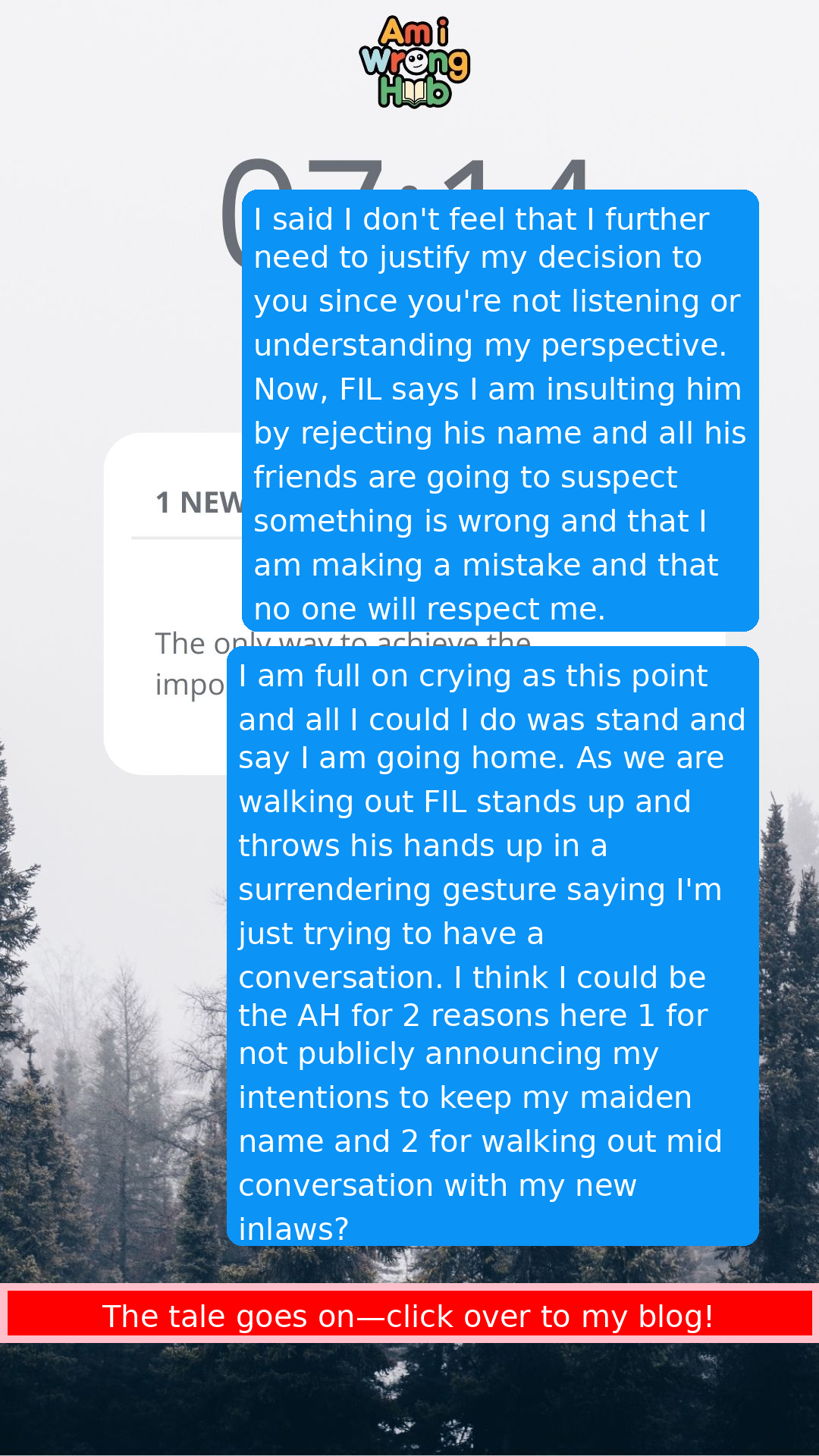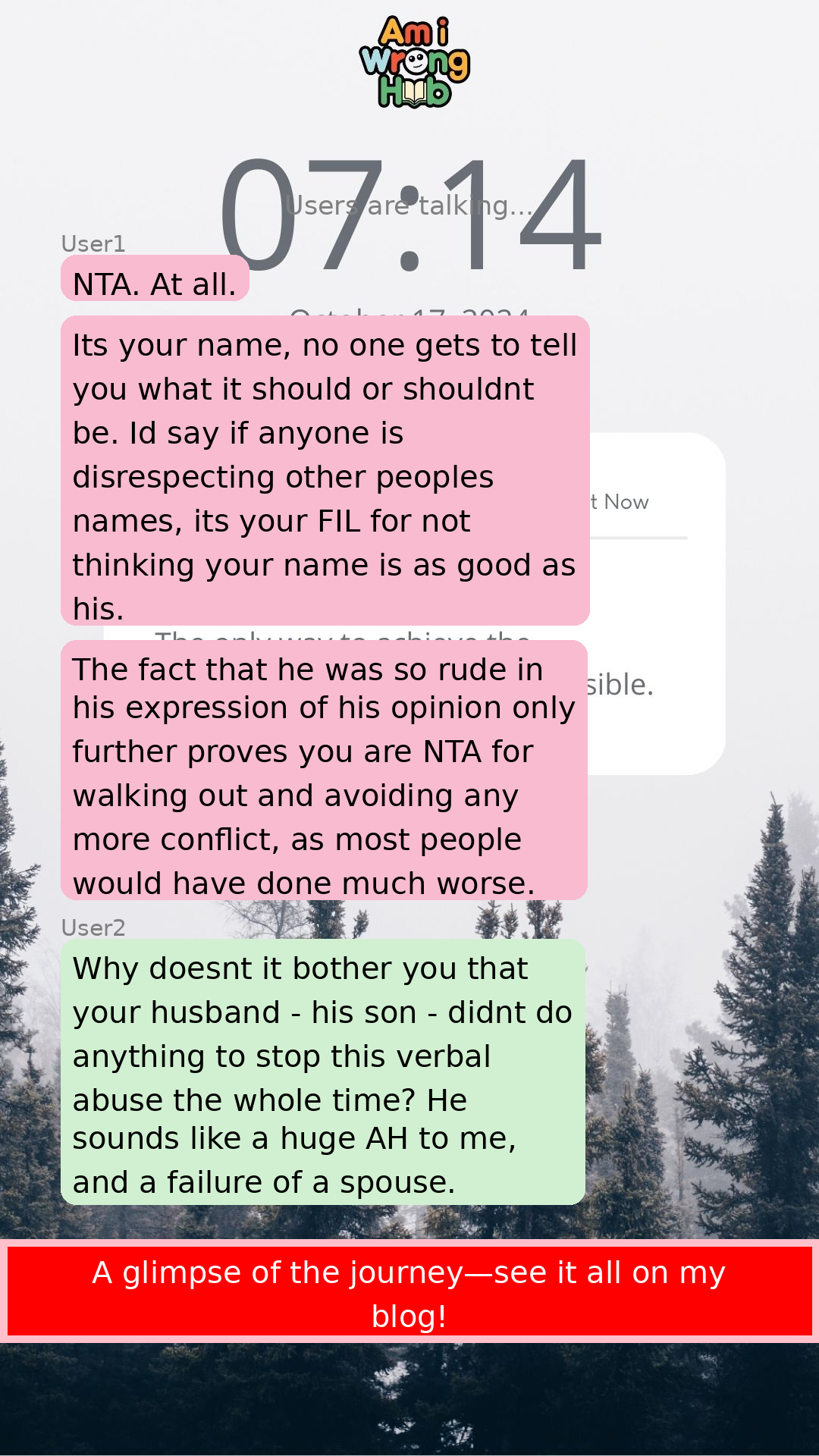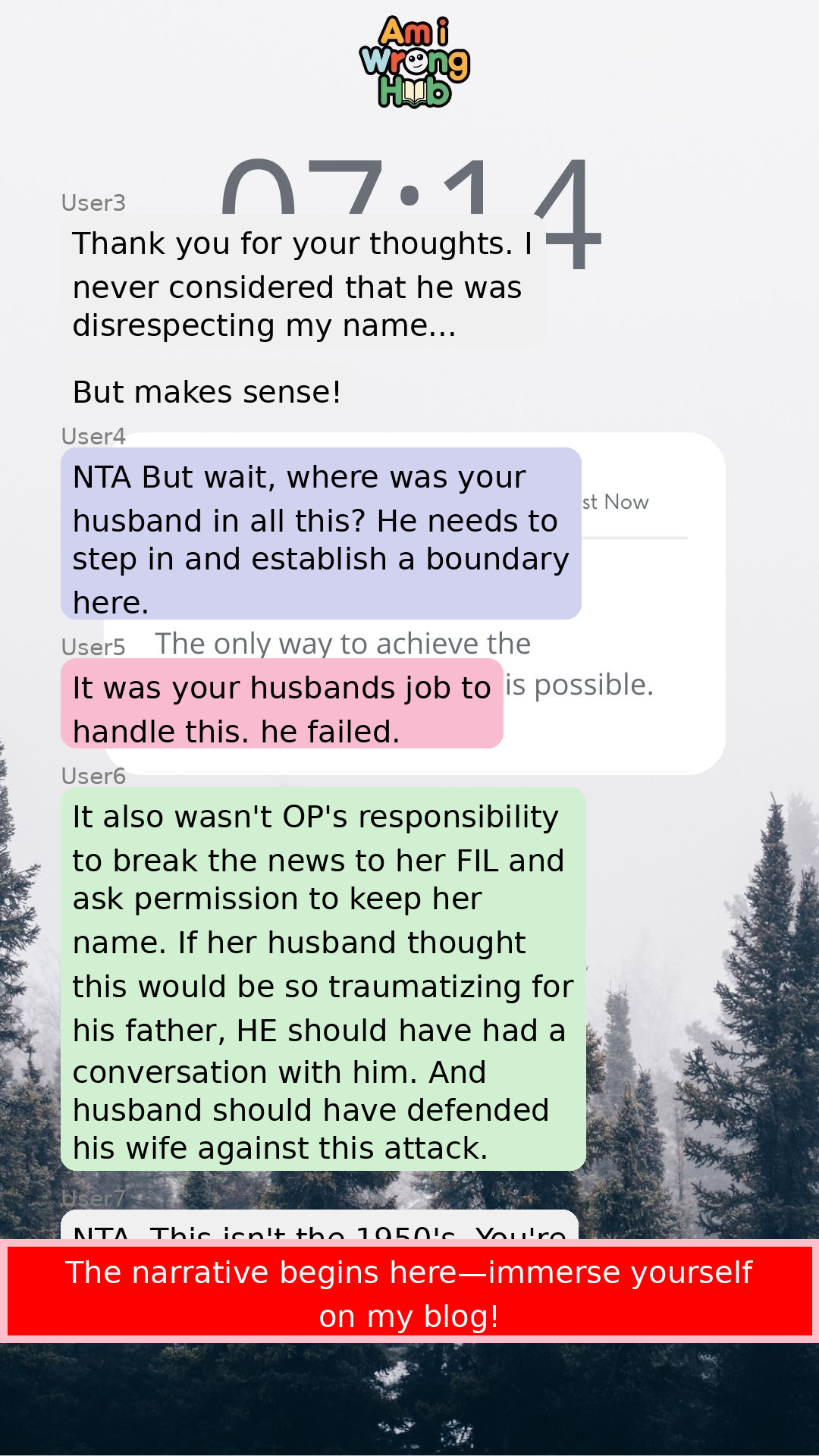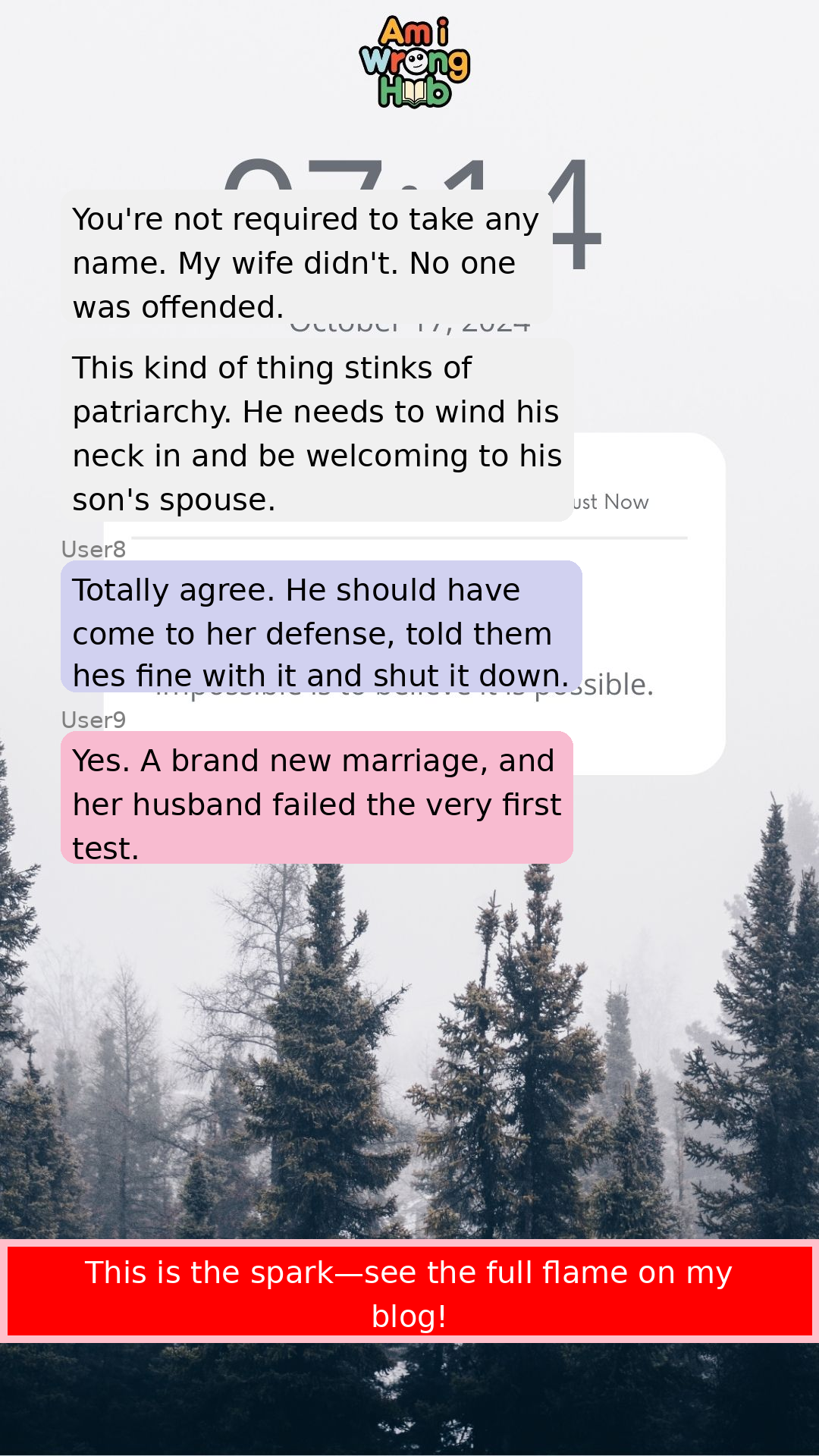AITA for not taking my FILs last name after getting married?
 Image credit: Pixabay (This is example image – Not the actual photo)
Image credit: Pixabay (This is example image – Not the actual photo)
Is Keeping Your Maiden Name a Reason to Cause Family Conflict?
After a year of marriage, a woman grapples with whether she’s in the wrong for keeping her maiden name, a decision she thought was settled between her and her husband. When her in-laws confront her about it, the conversation quickly escalates into a heated argument, leaving her in tears and questioning her choices. This story resonates with many who have faced family expectations versus personal identity, highlighting the often-unspoken pressures surrounding marriage and name changes in the U.S. culture.
Family Drama Over Name Change: A Wedding Tension Conflict
After a year of marriage, a woman reflects on a conflict with her in-laws regarding her decision to keep her maiden name. Here’s a breakdown of the situation:
- Background: The couple agreed before marriage that the wife would retain her last name. This decision was not communicated widely.
- Wedding Announcement: During the wedding, the pastor introduced them without mentioning last names, which may have contributed to the misunderstanding.
- Family Dynamics: The wife mentioned her name decision to her sister-in-law (SIL), but it’s unclear if this information reached her in-laws intentionally or accidentally.
Upon returning from their honeymoon, the couple visited the husband’s parents, expecting a pleasant gathering. However, the visit quickly escalated into a confrontation:
- Initial Conflict: The father-in-law (FIL) initiated a serious discussion about the importance of his last name, emphasizing its value in their community.
- Wife’s Response: The wife expressed her reasons for keeping her name, including:
- Changing her name would be complicated and costly.
- Her last name is unique, and she has a strong personal connection to it.
- Her home business and academic credentials are established under her maiden name.
- In-Law Reactions: The FIL dismissed her reasons, citing that other daughters-in-law had changed their names without issue. The mother-in-law (MIL) also downplayed the costs involved, referencing her own experience from decades ago.
The conversation became increasingly heated, with the FIL claiming that her decision was an insult to him and that it would lead to a lack of respect from others. The emotional toll of the discussion led the wife to tears, prompting her to leave the situation:
- Emotional Exit: Overwhelmed, she decided to leave, stating she needed to go home. As they departed, the FIL attempted to downplay the situation, claiming he was merely trying to have a conversation.
In reflecting on the incident, the wife questions her own actions:
- Self-Doubt: She wonders if she is at fault for not announcing her decision to keep her maiden name publicly.
- Conflict Resolution: She also questions whether walking out during the conversation was inappropriate.
This situation highlights the complexities of family dynamics and the challenges of conflict resolution, particularly in the context of wedding tension and name changes. The wife seeks clarity on whether her actions were justified or if she contributed to the family drama.
This is Original story from Reddit
 Image credit: Pixabay (This is example image – Not the actual photo)
Image credit: Pixabay (This is example image – Not the actual photo)
Story
Hi all. I got married to my husband 1 year ago, and I am still wondering if I’m an AH…
Before we got married, my husband and I talked and agreed that I could keep my current last name. It never occurred to me that I should tell anyone of our decision to not change my last name.
At our wedding, the pastor announced us as Mr. John and Mrs. Jane (fake names for anonymity). No last name was announced. But I guess I did mention to my new SIL that I was keeping my name. I’m not sure if she told my in-laws intentionally to cause conflict or if she actually didn’t realize I hadn’t told them.
Anyways, once we got back from our honeymoon and finished moving into our new house, my husband’s parents invited us over. What I thought was going to be a nice first visit as husband and wife quickly turned into a fight.
My FIL said he had to have a serious conversation with me, and he began talking about how great and wonderful his last name is and how people will automatically respect me in his community just because I would have the same name as him. I calmly, as I could, I was so upset at this point I could hardly talk, told him my reasons for not wanting to change my name.
1. It’s complicated and expensive to change IDs and such. 2. My current last name is unique; I’ve never met another person outside of family with it. 3. My home business and degree were established under my current name.
None of these reasons were good enough for him. He replied, “Well, other DIL changed her name, and she has the same degree as you,” and then MIL said it didn’t cost her any money to change her name, but that was 40 years ago; things change.
I said I don’t feel that I further need to justify my decision to you since you’re not listening or understanding my perspective. Now, FIL says I am insulting him by rejecting his name and that all his friends are going to suspect something is wrong and that I am making a mistake and that no one will respect me.
I am full-on crying at this point, and all I could do was stand and say I am going home. As we are walking out, FIL stands up and throws his hands up in a surrendering gesture, saying, “I’m just trying to have a conversation.”
I think I could be the AH for two reasons here: 1. For not publicly announcing my intentions to keep my maiden name, and 2. For walking out mid-conversation with my new in-laws?
View the Original Reddit Post Here
Summary of Reddit Comments
The top Reddit comments reveal a strong consensus around NTA due to the belief that the original poster (OP) has the right to choose her name without external pressure and that her father-in-law’s disrespectful behavior was unacceptable. Most users agree that OP’s husband failed to support her during the confrontation, highlighting a significant issue in their relationship and suggesting that he should have defended her against his father’s verbal abuse.
Overall Verdict
NTA
Expert Advice for Resolving the Conflict
Conflict over name changes can be emotionally charged, especially when family dynamics are involved. Here are some practical steps for both the wife and her in-laws to consider in order to resolve this situation amicably:
For the Wife
- Communicate Openly: Schedule a calm and private conversation with your in-laws. Express your feelings and the importance of your name to you. Use “I” statements to avoid sounding accusatory, such as “I feel strongly about keeping my name because it represents my identity.”
- Involve Your Husband: Encourage your husband to join the conversation. His support is crucial, and he should be prepared to advocate for your decision. Discuss this with him beforehand to ensure he understands your perspective.
- Set Boundaries: If discussions become heated or disrespectful, it’s okay to set boundaries. Let them know that you are willing to discuss this topic, but only in a respectful manner.
- Seek Understanding: Try to understand their perspective as well. Ask questions about why they feel so strongly about the name change and listen to their concerns. This can help de-escalate tensions.
- Consider Compromise: If appropriate, discuss potential compromises, such as using both names in certain contexts or finding a way to honor family traditions without sacrificing your identity.
For the In-Laws
- Practice Empathy: Acknowledge your daughter-in-law’s feelings and the significance of her name to her. Understand that her decision is not a personal affront but a reflection of her identity.
- Listen Actively: Allow her to express her reasons without interruption. Show that you value her perspective, even if you disagree. This can foster a more respectful dialogue.
- Reflect on Traditions: Consider the importance of family traditions versus individual choices. Discuss how family names can evolve and adapt over time while still honoring heritage.
- Support Your Son: Encourage your son to support his wife. A united front can help ease tensions and show that you respect their partnership.
- Apologize if Necessary: If the conversation escalated to hurtful comments, consider offering an apology. Acknowledging the emotional toll of the discussion can help rebuild trust.
Conclusion
Resolving conflicts around name changes requires patience, understanding, and open communication. By taking these steps, both the wife and her in-laws can work towards a more harmonious relationship while respecting individual choices and family dynamics.
Join the Discussion
 Image credit: Pixabay (This is example image – Not the actual photo)
Image credit: Pixabay (This is example image – Not the actual photo)
What do you think? Would you have handled this differently?
Share your thoughts below! Vote: Do you agree with Reddit’s verdict?







